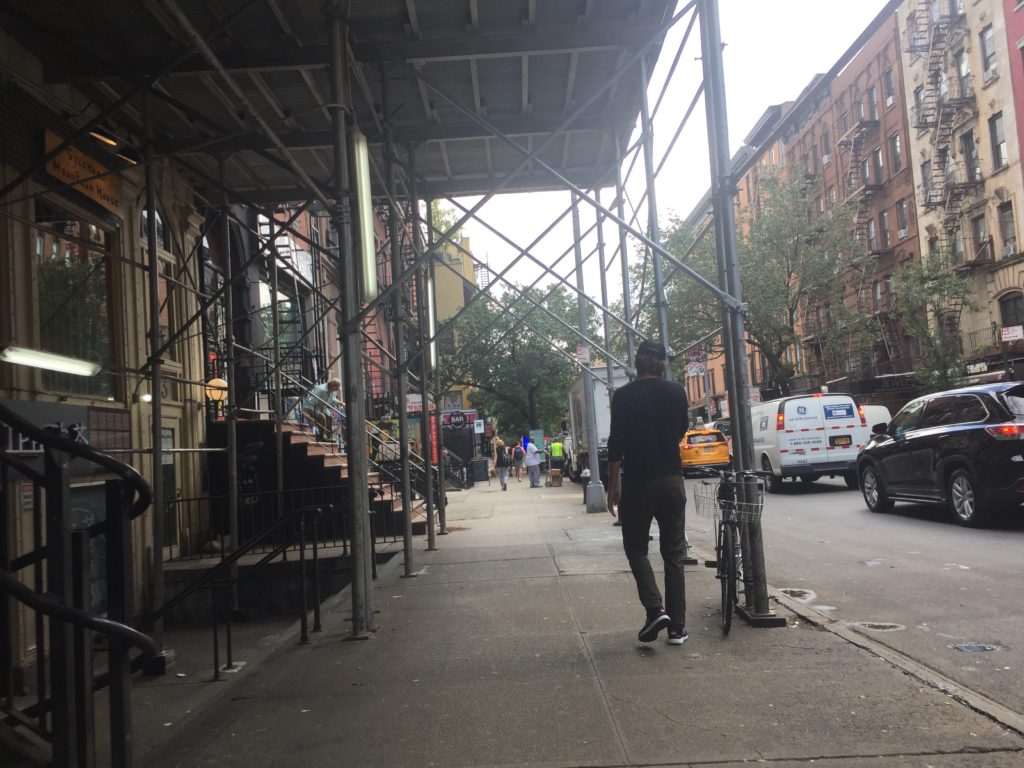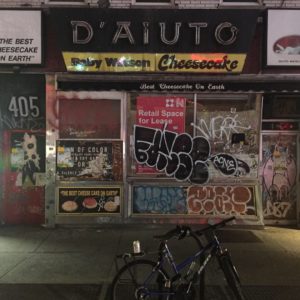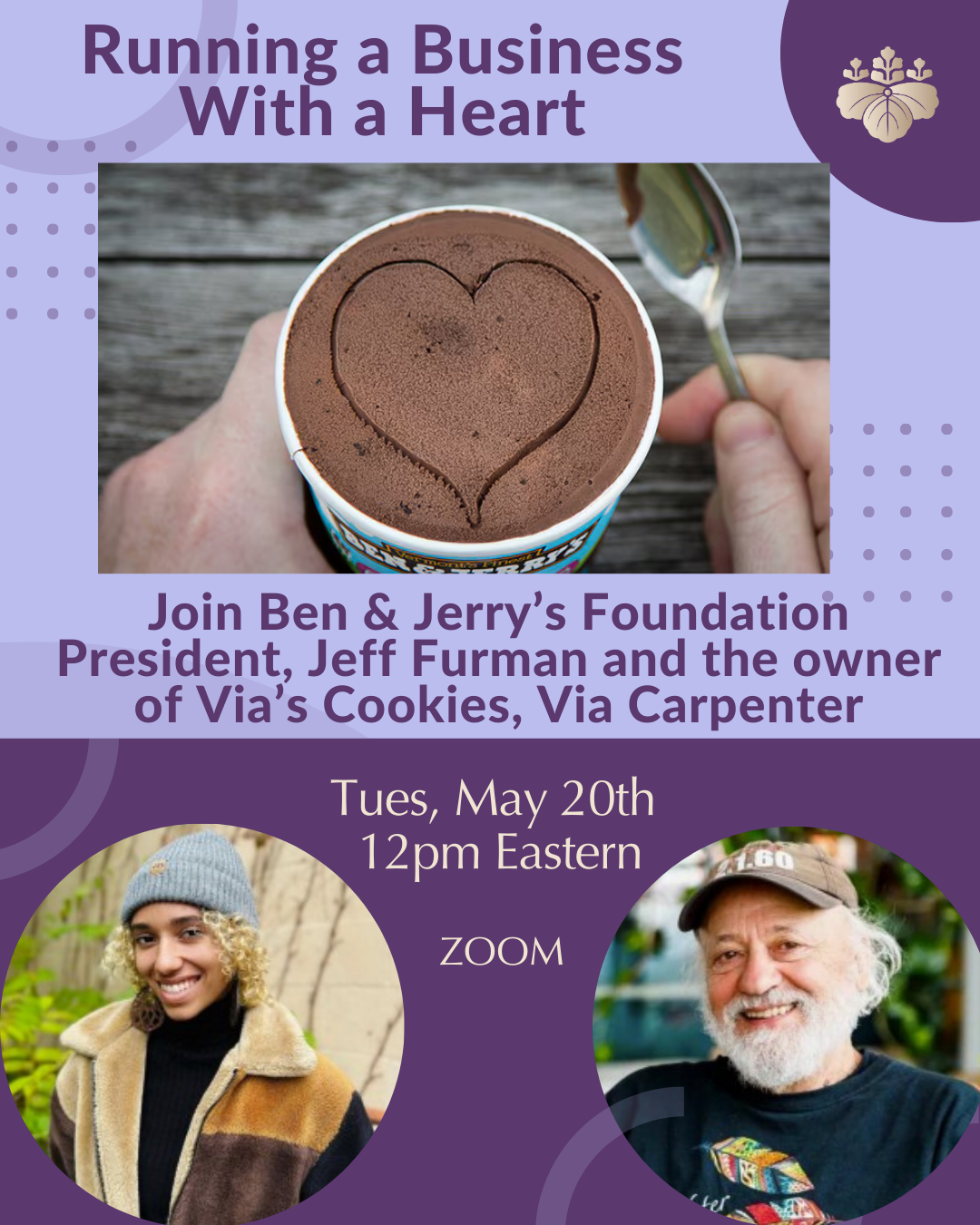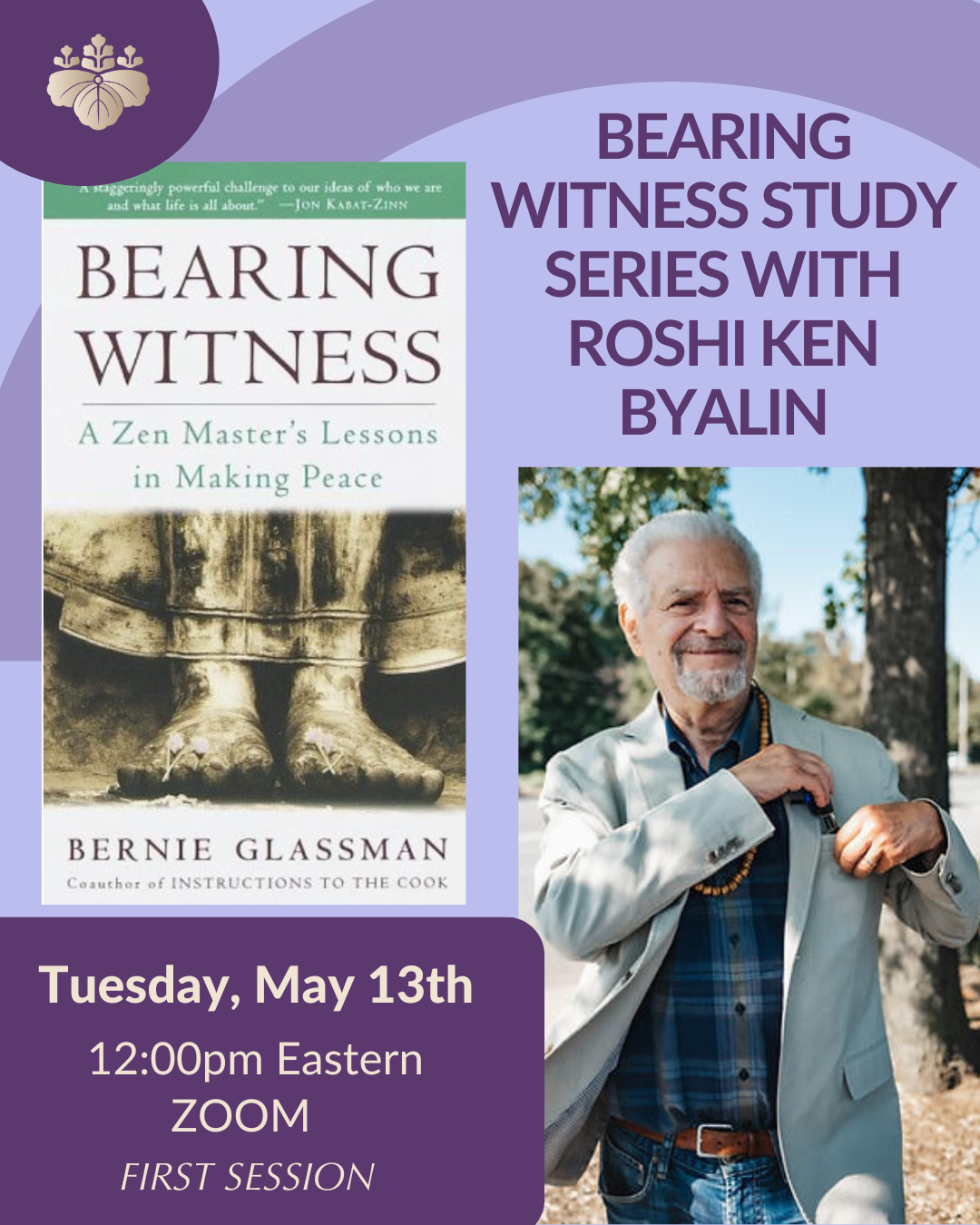This reflection was written by Rami Efal, Executive Director of Zen Peacemakers International, after a September 2018 Street Retreat in Washington DC. Cameras are usually not brought on a Street Retreat: the photos, featuring New York City, were taken the night before the retreat began. The group photo below was taken in Washington DC on the last day of the retreat.
A soft, deep voice wakes me up. I raise the black T-shirt I use as a blindfold to block the neon lights on the ceiling above, and see a hand placing a plastic bottle of water next to the duffel bag I use as a pillow on the hard concrete. In my waking torpor I notice that the water bottle smells like french fries. I look around and see a McDonald’s meal bag further down along the side of my cardboard bed.
I look up and see the man holding a cardboard box in one arm, from which he draws more meal bags with his other hand, placing one on the ground next to each figure lying along the walkway. Dazed, hungry, I stuff the fries and burger in my mouth, lower my improvised blindfold and turn back to sleep.
What seems minutes later, a woman’s voice wakes me up to give me another water bottle, another burger and two dollar bills. She is about to step away, then turns back, finds another five dollar bill, and hands it to me. She moves to the next one. When done, she and another man return to a sparkly-white SUV parked on the other side of the fence. They bring two thick blankets and put one on the homeless man sleeping to my left. The other thick pink blanket she places over Matt. Matt is a NASA engineer. His eyes are open. The image of him receiving the blanket sears my mind. I imagine him thinking the same thought as me: “I’m not homeless. I’m on a street retreat for a few nights. I shouldn’t take this.” Shame mixed with dumbfoundedness, which turns to overwhelm and gratitude. I receive. I hold the feeling. I breathe deeply. That same voice whispers in my mind, “Give it away.”
On the street retreat, spending four days and three nights on the streets of Washington DC, USA, mere blocks from the White House, my mind often muses about giving.
I pick up the second burger. Matt and Genro hand me their burgers too, in silence, and I walk in a circle around the metro escalators in the concrete enclave of the McPherson Square Station. Some men, some women. Excluding our group, I count 30 sleeping individuals shoulder to shoulder, avoiding the rain on the asphalt twenty feet away. The only exception is the lean, tall man sitting in a wheelchair by the wall. Other than a sweatshirt he has nothing warm on. I leave the burgers next to three people. As I arrive back at my cardboard bed, Matt is placing the blanket he’d just received on another sleeping figure.
“Give.”
Yunyan asked Daowu “How does the Bodhisattva of Great Compassion use so many hands and eyes?” Daowu said, “It’s just like a person in the middle of the night reaching for a pillow.” (1)
What if there is no pillow and the mattress is made of concrete? I need to pee, there are spiders and rats and drugs everywhere, and the water is running out? What about me?
Another evening, the seven of us are sitting a hundred feet from the White House in meditation. A rally is taking place not far from our circle. “No no no Kavanaugh no no.” The protesters chant to beatboxing. Last night it was something about Puerto Rico. The evening air is dry and pleasant. “We! Will! We! Will! Trump You!” The ever-lit white house on the other side of the fence has no lights on inside.
The city around us has a lot of modern concrete architecture next to majestic Corinthian columns– between them, small grassy parks. Traffic during congestion is so bad all lanes change to accommodate one direction. There are lots of cones and signs. On one of our morning walks we stroll the promenade, the Potomac River on our left. Nice promenade. “This is nice!” For a moment I feel like a tourist. I forget about the cardboard and manic chatter around the dining table at Miriam’s Kitchen, the soup kitchen we just left.
Against the beautiful waters to our left stand great steel barriers, twenty feet tall. Matt explains these are storm walls. They have just gone up. Hurricane Florence has just hit the Carolinas. I imagine living on the street, no access to news, not knowing the big picture, the surprise of a hurricane. Flooding. Tsunami. “Not Knowing can be dangerous.” I smile.
«I want to get enough money to pay off my commercial license debt, get some real estate, have a life.” Martin speaks to us from his place on the concrete floor, his legs sticking out of the circle, a styrofoam box filled with fried chicken on his knees, his eyes moist. We finish the first round of council practice, going around and sharing highlights of the day, when Martin parks his bike next to us. «Who are you folks» he asks. I explain. We are not homeless, but tonight we sleep on the street as part of a spiritual practice, to bear witness, to come closer to people and parts of life we don’t usually know and understand.
He passes his eyes from one to another around the circle and he asks, «Where you all from?»
We went around. New York, Western Mass, Maryland, DC, Staten Island. I say Massachusetts and the name just rolls out of my mouth without a moment’s hesitation. So much conviction and certainty there. The whisperer returned, «I’m not from here. I have a home. My friend Annie is holding my belongings and wallet and credit cards and cell phone at her home and when this is done I will live a much more comfortable life.»
A feeling of bittersweetness. The circle is silent. Martin is trying to make a living by selling a newspaper published and circulated by people of the street. Earlier that day we’d all begged, not too much success. We give him ten dollars out of that money. He says thanks, rolls his bike to a cardboard bed ten feet away, and leaves. He’d return later. I’d see him on my round around the Metro escalators when I give away the burgers.
Martin was black. So were nearly all the street people in DC. We stood out, big time. On the first night we met Wendell, a round, cheerful and graceful black man. He gave us tips that Farragut park is quiet– has less ‘going on,’ the 24 hours Wawa store, no sleeping in front of the White House (snipers). He no longer sleeps on streets. He is proud but says with a smile that having his own place has its own set of issues. “God bless,” he says often and laughs. When he sees us putting down our cardboard on the grass he warns that police will come to check us out, but “Don’t worry, looking the way you do, they won’t bother you.”
One afternoon Matt and I search for the Georgetown Ministry where the group plans to have lunch. We pass a very affluent colonial-architecture neighborhood. We see a line of people waiting in front of the building and think we found the pantry. A policewoman stands next to me so I ask her what’s going on. She says, “This is the Apple store, people are waiting to get the new iPhone.” I laugh and say to her, “Haha, soup kitchen for rich people.”
When we beg, we leave our bags with Genro at Dupont Circle Park and spread out. Bob stands in front of a bookstore. I duck into a Starbucks and ask for an empty cup. “Plastic or paper? Short or tall?” A voice speaks inside, irritated, “Just give me the cup, I feel so uncomfortable begging for a cup.” I hold the cup with two hands and make eye contact with passersby. “Excuse me, ma’am, would you spare a dollar?” Most ignore me. Men, women, families, of all colors and ages. I stay away from young women, though. I think of the #MeToo sign the White-House-Hip-hopping-Rally folks held the other night. Am I being considerate, trying not to appear aggressive or creepy to them? Or am I embarrassed by my unkempt clothes, my unbrushed teeth? Embarrassed to be me?
I end up with one dollar. Others have similar success. Other Matt (there were two men named Matt in our group) scores donut holes from Krispy Kreme. We cheer. We gather back at Dupont Circle and put all our begging into one cup. We plan to use the money to buy an apple or an orange for the Gate of Sweet Nectar we will be doing later, a Buddhist ceremony that Zen Peacemakers conduct in many places around the world, feeding the hungry spirits everywhere. The hungry spirit inside of me advocates against putting the dollar in the cup. “Keep the dollar. There is enough there. What if I want a cup of coffee?” Another part of me says, “You are betraying the others, buddy.” Other Matt places the donut holes in the cup.
Greed gets a bad rep. At the bottom of my greed is fear. It says «I have needs. I am in charge of this body. I must preserve it first, just like in an airplane emergency, you first take care of yourself by putting your own air mask on, and then put the air mask on the child.»
The word greed here, a block from the White House, has a different gravity.
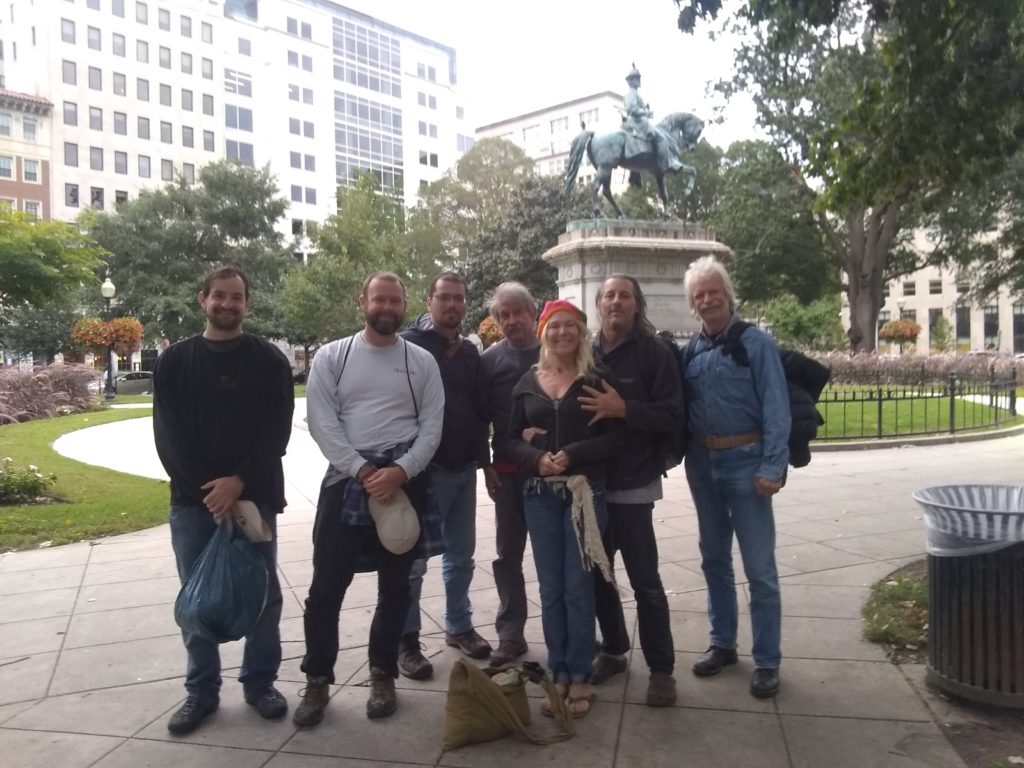
Another component here. It’s Faith. Faith’s voice says, «I have so much faith in my buddha nature, the universe provides, ask and you shall receive.” That part continues, “Everyone has the capacity of wise awareness, compassion is innate in all. They got what they need, they don’t need me to give them anything.” One old koan asks, «Shakyamuni and Maitreya are servants of another, tell me who is that other?» The answer is, «Don’t draw another’s bow, don’t ride another’s horse, don’t discuss another’s faults, don’t explore another’s affairs.»(2) One interpretation you may hear here is “Mind your own business!” But what IS my business? Where does it end? What’s excluded?
That same eventful night around the metro escalator a rowdy group of young women leaves the club, laughing up a storm. A couple is having a big argument. I hear a homeless guy, sleeping a few shoulders down from me, walking to them. «Excuse me miss,» his voice is soft. «My buddies and I are trying to sleep. Could you please keep it down?”
Why did I give away the second burger? Why did the SUV woman give Matt a blanket? Why was Wendell so nice to us?
Even when all is made of concrete, it’s simple, immediate. Like reaching for a pillow in the middle of the night.
Giving is all around me. As I walk the length of the Treasury Department building east of the White House, a group of white men in slick black suits sidestep a large soda cup standing upright in the middle of the sidewalk. Genro leans forward and picks it up, never losing the momentum of his stride. «The whole world is me,» he says and drops it into a trash can. Later, Bogai and Sarah stand up after a meal, run into a Starbucks across the street from McPherson Square, get two pairs of plastic gloves, pick up a trash bag from an orange maintenance cart on the corner and start collecting trash from the grass.
A “Miriam’s Table” food van pulls up at 5:30 every evening, friendly volunteers handing out baloney sandwiches. A street man feeds his to the seagulls. On the church stairs, a man helps up a teenager, high on a ketamine cigarette I saw him roll two minutes ago. At night, the ducks curl beside our cardboard beds, their beaks tucked back in their own feathery pillows.
Quotes from:
(1) Blue Cliff Record case 89
(2) Gateless Gate #45.
Two-thirds of the program fees for this Street Retreat were given to shelters, soup kitchens, and charities that benefit the homeless and the retreat participants during the retreat. The remainder is given to the guiding teacher. The donations collected for this retreat benefitted McKenna’s Wagon, Miriam’s Kitchen, Charlie’s Place, Church of the Epiphany, and Missionaries of Charity. Read more about Street Retreats.
 About Rami Efal. A dual citizen of Israel and the USA, Rami has been a student of Zen Buddhism since 2005 and has lived for 4 years at Zen Mountain Monastery and Zen Center of New York City. He met Bernie Glassman at the 2013 Auschwitz Retreat, became his attendant in 2015 and, following Bernie’s stroke in 2016, was hired as the executive director of Zen Peacemakers International. Since then Rami has organized all aspects of the organization, including the Auschwitz and Native American Bearing Witness programs. Prior to this, Rami participated in Israeli-Palestinian dialogues in New York City, trained in peace-building at Vermont’s School of International Training, co-led multi-day workshops in Nonviolent Communication with the New York Center for NVC, and was an illustrator and fine artist. He has presented on art and peace-building at the Warsaw Museum of Modern Art, on NPR and at the UN headquarters in New York City.
About Rami Efal. A dual citizen of Israel and the USA, Rami has been a student of Zen Buddhism since 2005 and has lived for 4 years at Zen Mountain Monastery and Zen Center of New York City. He met Bernie Glassman at the 2013 Auschwitz Retreat, became his attendant in 2015 and, following Bernie’s stroke in 2016, was hired as the executive director of Zen Peacemakers International. Since then Rami has organized all aspects of the organization, including the Auschwitz and Native American Bearing Witness programs. Prior to this, Rami participated in Israeli-Palestinian dialogues in New York City, trained in peace-building at Vermont’s School of International Training, co-led multi-day workshops in Nonviolent Communication with the New York Center for NVC, and was an illustrator and fine artist. He has presented on art and peace-building at the Warsaw Museum of Modern Art, on NPR and at the UN headquarters in New York City.
Read more about Rami Efal in this interview, and read his reflection on a plunge with refugees in Greece in 2016.

